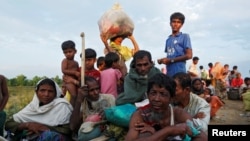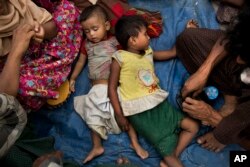The second phase of a campaign to vaccinate tens of thousands of Rohingya refugee children against cholera gets underway Saturday in Cox’s Bazar, Bangladesh.
The oral cholera vaccination campaign, which is being led by the World Health Organization, is targeting nearly 180,000 children between the ages of one and five years. They will receive an additional dose of the vaccine for added protection.
The children had received a first dose of the vaccine when the campaign was launched on October 10. At that time, the oral cholera vaccine was administered to more than 700,000 people above the age of one.
WHO spokesman Tarik Jasarevic says health workers also will give all children up to the age of five oral polio vaccines during the campaign to protect them against this crippling disease.
He says so far, no confirmed cases of cholera have been reported.
“But, there is a risk and this is why we are doing this oral vaccination," Yasarevic said. "And, WHO has set up a lab together with the ministry to do water-quality monitoring. And, the results show that this testing from drinking water that only 17 percent of the samples collected and tested from various settlements met Bangladesh and WHO standards during the reported period.”
More than 600,000 Rohingya refugees escaping violence in Myanmar have arrived in Cox’s Bazar since late August. They are living in congested, squalid, unsanitary makeshift settlements — a perfect breeding ground for cholera and other diseases.
Jasarevic says there has been an outbreak of acute watery diarrhea. At present, though, none of the lab tested cases has been confirmed as cholera. He says the most serious health risks are acute respiratory infections and measles.





